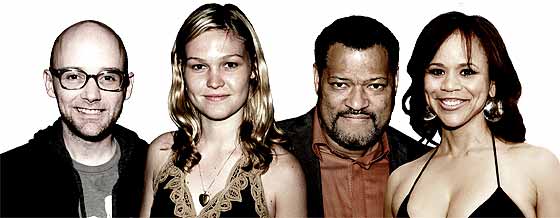
When the folks at the Tribeca Film Festival invited me to be a juror for their New York Loves Film Documentary Feature competition, it was hard to refuse, especially when they said that two of my fellow jurors would be Rosie Perez and Moby. Launched in 2002 to bring business (and fun) to a devastated neighborhood, the Tribeca Film Festival has distinguished itself mightily from its elite uptown cousin, the New York Film Festival. It shows nearly ten times as many movies, some of them god-awful. It hosts premieres of big-budget Hollywood beanbags like Poseidon. But it is a festival that is genuinely festive. Does the snooty NYFF host a parade and street fair? Do movie gluttons race from theater to theater clutching marked-up schedules—seeing three or four movies in a day? Do they see films that have such stunning immediacy? Viva Tribeca!
I admit I hoped to hobnob with other celebrity jurors like Laurence Fishburne, Josh Lucas, Julia Stiles, Kelly Lynch, and Lou Reed. Fat chance. Celebrities have a tunnel vision for one another. Rosie greets Laurence. Moby makes a beeline for Lou (who has the teeny-weeniest shoulders). Julia, all willowy poise, enters and leaves without surveying the room. Kelly is deep in conversation with festival co-founder Robert De Niro, the world’s least approachable man. I content myself with swag. You wouldn’t believe the gift bag, which includes a video iPod. Although it’s for services rendered (jurors aren’t paid), I’m ambivalent about journalists’ accepting gifts. My head says no, no, no—but my wife says yes, yes, yes. Easy call.
New York Loves Film is distinguished from the International Documentary competition in that directors and/or subjects must be New York–based. My favorite is Linda Hattendorf’sThe Cats of Mirikitani, in which Hattendorf discovers homeless, rather dotty 80-year-old Japanese-American artist Jimmy Mirikitani in Washington Square Park. Then planes crash into the World Trade Center, and she installs Jimmy in her apartment, where they watch reports of violence against Arab-Americans. It brings up buried traumas—like the California internment camp that was Jimmy’s home during World War II. Great documentaries like Cats are often the work of lucky accidents, and of filmmakers open enough to exploit them. (Jimmy likes being exploited. At the screening, he wouldn’t stop singing, even when Hattendorf tried to field questions.)
My other favorite documentary—also interventionist—is Dan Lohaus’s When I Came Home, which begins as a portrait of homeless vets with post-traumatic stress disorder and comes to focus on one: Herold Noel, fresh from Iraq and living out of his car, unable to get benefits or counsel from an overtaxed VA. It’s the media—here, the New York Post—that first take his case to the public. Watching Noel evolve from semi-unhinged to an eloquent spokesman is fiercely moving.
Mary Jordan’s Jack Smith and the Destruction of Atlantis is a gorgeous and mysterious look at the angry experimental filmmaker and a bracing reminder of when camp was actually subversive. Kristi Jacobson’s Toots is a delicious portrait of her grandfather, the saloon keeper Toots Shor. One could complain that Glenn Holsten’s wrenching profile of Mychal Judge, the gay priest killed while administering last rites after the World Trade Center attacks, is a hagiography, but what do you expect from a film called Saint of 9/11?
The jurors meet on May 5. In addition to Rosie and Moby, my group consists of filmmaker and former Time Out New York editor Joe Angio, Glenn Kenny of Premiere, and the winner of this category last year, Victor Buhler. Victor arrives with five criteria for judging, including political impact and “sacrifice and courage.” He is shot down, but not before the earnest Moby pipes up that social responsibility should, indeed, outweigh everything. The formidable Rosie demurs—a movie should be judged on its own terms, she insists. (Rosie becomes, predictably, the de facto foreman.) I argue passionately for Cats, but one juror thinks it meanders. We can all agree on Home. And it’s a good call, since the movie dovetails with the international documentary winner, Deborah Scranton’s The War Tapes, which features gripping footage of Iraq taken by National Guardsmen: the horrors they’d be unable to shake when they came home.
The winners are announced the next night at a huge dim-sum hall in Chinatown. De Niro speaks. Reportedly a smart man, he reads his platitudes as if he learned English phonetically. But the act adds to his aura, and his partner Jane Rosenthal humanizes him. It’s a little disconcerting when our award is dispatched quickly and without a jury spokesman, whereas Ken Burns gasses on and on when presenting his prize. I ask jury coordinator Nancy Lefkowitz why we didn’t get to bore the audience, too, and she says, “Moby was supposed to do it, and he didn’t show.” (So much for social responsibility.) What about Rosie? “Sick.” We were out of celebs.
It’s great when Cats wins the audience prize—both my favorites have been rewarded. But after a ceremony in which you have, proportionately, one winner for every sixteen losers, the vibe can get ugly. Catching a breath of air outside, I watch many filmmakers leave dejectedly. “The awards are all politics,” hisses one guy. He says that like it’s a bad thing, but I think it’s what makes the Tribeca Film Festival so sensational.
